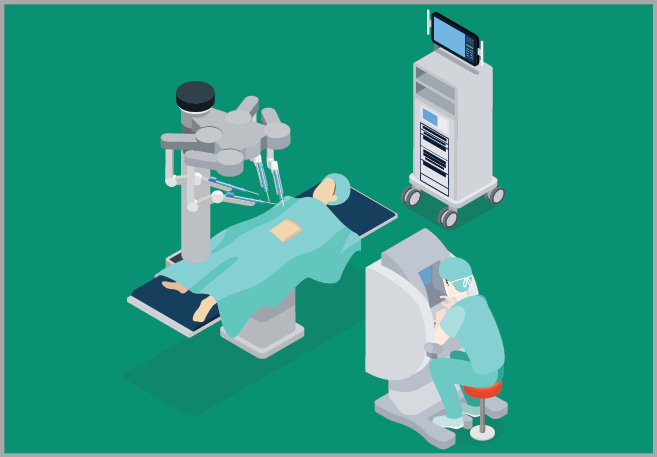Robotic surgery


eolas examines the robotic surgical services on offer to public patients and how surgery has been revolutionised by this technology.
The Robotic Assisted Surgery (RAS) Program at University Limerick Hospital is at the forefront of future surgery delivery. The hospital now offers the robotic surgery to all patients in the Mid-Western region. The control, accuracy and versatility provided by the console controlled instruments is unmatched. It is the most advanced form of keyhole surgery and is of the highest standard currently available globally.
During surgery, the robot is secured or ‘docked’ to the patient and has four working arms, each requiring only an 8mm skin incision, to which operating instruments are attached. Once docked, the surgeon who is positioned at a console nearby controls the robotic arms. The 3D view provided to the surgeon is unprecedented in surgery to date. The dual console allows two surgeons to operate simultaneously ensuring optimal decision-making and doubling the expertise.
Until the RAS Program was launched in May 2016, this type of surgery was only available in private health institutions in Ireland or patients had to travel abroad. The program was funded by the Mid-Western Hospitals Development Trust and the University of Limerick.
The Minimally Invasive Surgery (MIS) Forum has also been established to provide evidence of regulatory compliance. The team comprises of around 15 professionals with meetings focusing alternately on morbidity and mortality. The robotic team performed extensive research and training prior to introducing the program. This included surgeons who travelled to the United States and Australia to complete robotic training fellowships.
Surgical approaches and techniques have changed dramatically over the last 25 years. Traditionally, patients with kidney or colorectal cancer would have needed a large open incision (20cm or more) to remove the affected organ. However, keyhole surgery revolutionised surgical practice. Robotic surgery has further enhanced keyhole surgery benefits by allowing a level of technical precision that is not possible in traditional surgery.
Benefits for the health system
Major surgery for kidney or colorectal cancer with use of robotics has a shortened recovery time of around four days. Patients lose a minimal amount of blood during surgery, need less pain medication post operation, are mobilising on the first postoperative day and have a reduced length of stay in hospital.
This enhances patient flow through the hospital therefore benefiting all patients, who have had either robotic or traditional surgery, in the hospital due to the freeing up of occupied bed days. On average, three robotic operations take place each week in the hospital. Through the reduction in length of hospital stays and other savings such as instrumentation, the program runs at cost neutral.
The dual console is the only one of its kind in Ireland and allows for training of future surgeons. The surgeons are positioned side-by-side and the control of the surgical instruments can be swapped between both surgeons. UHL can also broadcast live surgery within the hospital to its junior doctors. This provides an educational program for medical staff, nursing staff and students.
The program so far has focused on the colorectal and urological fields. Gynaecological, endocrine and pelvic floor surgeons are undertaking robotic training and these specialities will lead to further utilisation of the robot and further opportunities for patients to benefit from the cutting edge of surgical technology.





